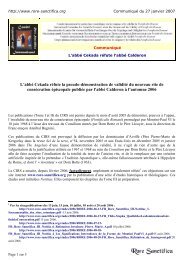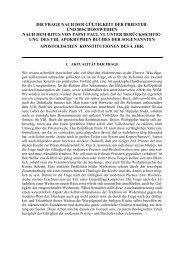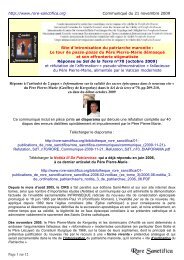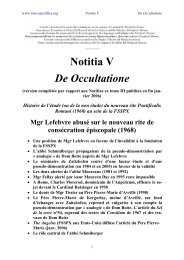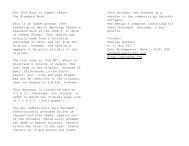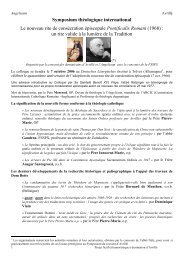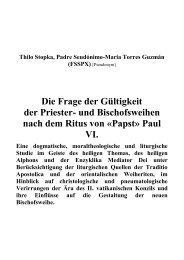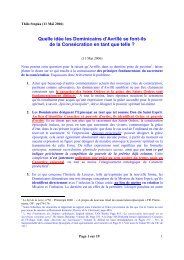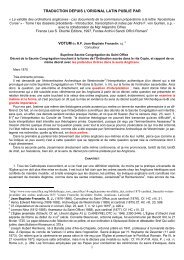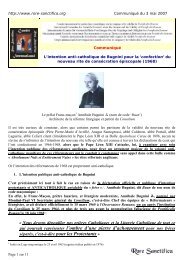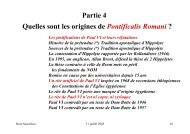THE ORDER OF MELCHISEDECH A Defence of ... - Rore Sanctifica
THE ORDER OF MELCHISEDECH A Defence of ... - Rore Sanctifica
THE ORDER OF MELCHISEDECH A Defence of ... - Rore Sanctifica
You also want an ePaper? Increase the reach of your titles
YUMPU automatically turns print PDFs into web optimized ePapers that Google loves.
threefold ecclesiastical ministry as it had existed in this country hitherto but:<br />
. . . a ministry <strong>of</strong> the word and sacraments, and not, as hitherto, a sacrificial priesthood . . . Only<br />
thus can we reconcile Cranmer's statement that he intends to "continue" the threefold ministry with<br />
the patent fact that he at the same time draws up an entirely new rite <strong>of</strong> ordination, in which the<br />
sacrificial function, so prominent in the ancient rite, is not merely put into the background, but, as<br />
we shall see, is altogether excluded, and excluded in such a way as to make it plain that its<br />
exclusion is deliberate and is equivalent to a denial that any such powers belong to the Christian<br />
ministry. 5<br />
As regards Cranmer's use <strong>of</strong> the word "continue", the Catholic Dictionary <strong>of</strong> Theology notes that:<br />
This ambiguous word could possibly mean "to keep on with an existing practice", but it also bears<br />
the meaning "to take up again; from a point <strong>of</strong> interruption", and it was exactly this taking up again<br />
from the apostolic age that Cranmer had in view . . . In his Miscellaneous Writings (p. 117) there is<br />
a paper he wrote in 1540 where in answer to a question he says: "In the New Testament he that is<br />
appointed to be a bishop or a priest needeth no consecration by the Scripture; for election or<br />
appointing thereto is sufficient." He puts the case that in some regions all bishops and priests have<br />
died, and says that it is not forbidden by God's law that the king <strong>of</strong> that region should make bishops<br />
and priests, so that the Word <strong>of</strong> God should not remain unpreached (ibid.). 6<br />
Father Yarnold argues quite correctly that a false belief about what the Church does in a Sacrament<br />
does not by itself prove an absence <strong>of</strong> the intention to do what the Church does. This is a fact which<br />
is examined in Appendix II. Had Cranmer continued to use the Catholic rite, even his known<br />
heretical belief might not have been sufficient to invalidate his ordinations, but by introducing a rite<br />
intended to exclude the essence <strong>of</strong> the Catholic priesthood he made manifest and public his<br />
intention to do other than the Catholic Church does. As was shown in the last chapter, this was a<br />
factor <strong>of</strong> which Pope Leo XIII took full cognizance when pronouncing Anglican Orders to be<br />
invalid, and it is scarcely credible that Father Yarnold should have considered it worth raising in his<br />
pamphlet.<br />
Father Yarnold also advances the fact that the Edwardine Ordinal<br />
contains the words "be thou a faithful dispenser <strong>of</strong> the word <strong>of</strong> God, and <strong>of</strong> his holy sacraments" as<br />
an argument in favour <strong>of</strong> the validity <strong>of</strong> Anglican Orders. 7 On the contrary, it indicates precisely<br />
the opposite.<br />
When considering the liturgical texts <strong>of</strong> the Protestant Reformers, it is essential to do so within their<br />
historical context and within the entire corpus <strong>of</strong> their writings. For example, it would be possible to<br />
extract certain statements by Cranmer to give the impression that he believed in the Real Presence<br />
in the Catholic sense but, as I have shown in Cranmer's Godly Order, such a procedure is not only<br />
dishonest but manifestly unjust to Cranmer. When a man is willing to die for a particular belief he<br />
should at least be given the credit for actually believing it.<br />
In 1530 the Emperor Charles V ordered the Lutheran princes to present a statement <strong>of</strong> their beliefs<br />
at a diet to be held at Augsburg. Accordingly, the famous Confession <strong>of</strong> Augsburg was drawn up. It<br />
was mainly the work <strong>of</strong> Philipp Melanchthon, but the text received Luther's approval. The Lutheran<br />
position was put in somewhat muted tones, in fact with deliberate ambiguity, in order to disguise<br />
the radical break from Catholic teaching. Article 5 was headed The Ecclesiastical Ministry and<br />
stated that there had been instituted "a ministry <strong>of</strong> teaching the gospel and <strong>of</strong> giving the sacraments<br />
(ministerium docendi evangelii et porrigendi sacramenta)". Superficially the statement appears to be<br />
orthodox, but it was clarified in the following year by Melanchthon, in his Apology for the<br />
Confession, when he set this phrase in specific opposition to the Catholic concept <strong>of</strong> a sacrificing<br />
priesthood.<br />
Our opponents (in other words the Catholics) understand the priesthood to be, not the ministry <strong>of</strong>



